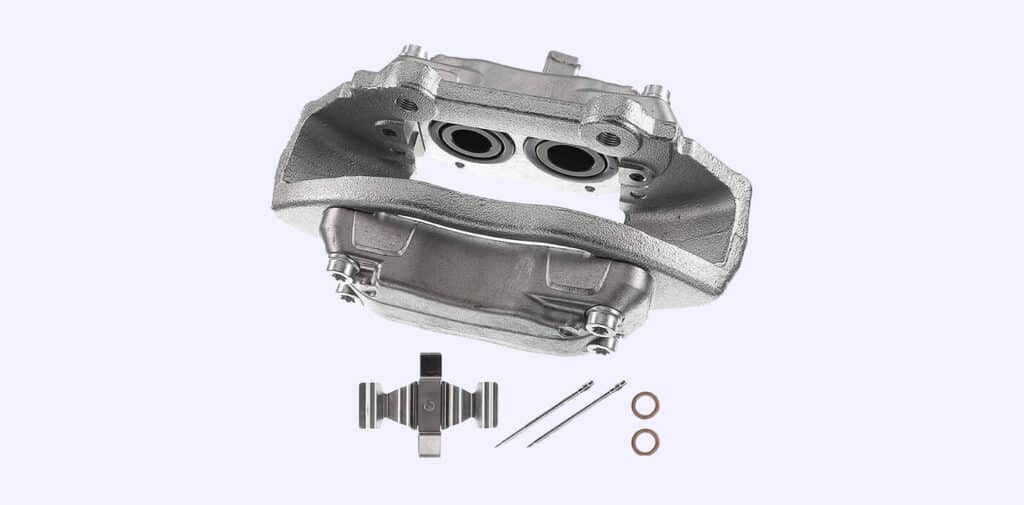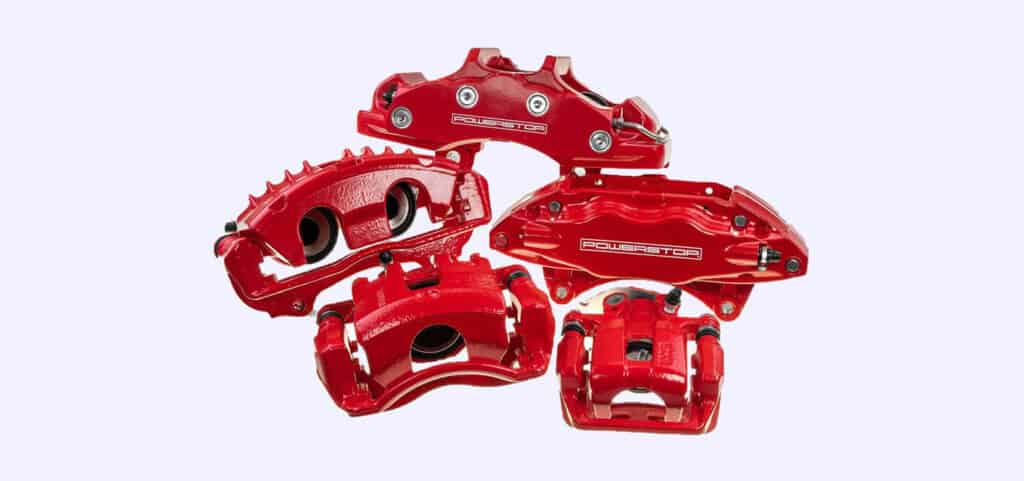Imagine you’re at the helm of a high-speed train, and you see a giant snowman on the tracks ahead. How swiftly you can stop the train would significantly depend on the strength of your brake system. In vehicles, the unsung hero behind that stop-on-a-dime performance is the brake caliper. Acting as the clamp of the disc brake system, it slows the car’s wheels by creating friction with the brake rotors. But not all calipers are created equal. Their efficiency largely depends on their material.
Understanding Brake Caliper Materials: What Makes Up Your Calipers?
The role of brake calipers in your car’s braking system is as pivotal as a culinary wizard (or chef, if you’re less inclined to the dramatic) in a bustling kitchen. The chef needs the right tools to create mouthwatering dishes, just as your vehicle requires the right caliper material to deliver top-notch braking performance.
Think of caliper materials as the ingredients for an exquisite meal. Each material, like every ingredient, has unique properties that contribute to the overall performance of your brakes. These materials are the very essence of your brake calipers, forming the backbone of their construction and influencing everything from their durability to their heat handling abilities.

Like chefs with their preferred ingredients, manufacturers choose different caliper materials based on the desired performance and cost-effectiveness. The three most common materials are akin to staple ingredients in a masterchef’s pantry: steel, aluminum, and composite materials. Each comes with its own set of advantages and challenges, and understanding these can help you make informed decisions about your vehicle’s braking system. After all, you wouldn’t want to pair a vintage wine with fast-food fries, would you?
Just like in cooking, the right combination of caliper materials can deliver a high-performance braking system that ensures your safety and enhances your driving experience. So, let’s dive in and understand more about these essential ‘ingredients’!
Steel Calipers: Characteristics, Advantages, and Disadvantages
Ah, steel calipers! Much like the tortoise from Aesop’s Fables, they may not be the quickest off the line, but they’re steady and dependable. They offer tremendous strength, just like an ox pulling a cart, making them a staple for heavy-duty applications that demand consistent braking performance.
Their fantastic heat dissipation characteristics are similar to that of a kitchen’s range hood, efficiently removing heat from the braking system and ensuring optimal performance even under demanding conditions. Think of it as your brakes’ personal cooling system, working hard to maintain an ideal temperature.
However, like carrying a heavy backpack on a long hike, the weight of steel calipers can be a disadvantage. Their robust nature can negatively impact your vehicle’s fuel efficiency and acceleration. It’s a bit like running a race with a heavy shell on your back – it can slow you down and demand more energy. So, while they’re hardy and dependable, steel calipers may not be the best choice for those looking for speed and efficiency.
Aluminum Calipers: Features, Pros, and Cons
Much like a hummingbird darts swiftly through the sky, aluminum calipers bring lightness and speed to your vehicle’s braking system. Significantly lighter than steel, these agile performers reduce the overall weight of your vehicle, potentially boosting fuel efficiency and acceleration. They’re perfect for those who crave a sprightly ride. However, every rose has its thorns. Aluminum calipers might struggle in the heat dissipation department, which could affect braking consistency in high-stress situations.
Transitioning from one metal to another, we now dive into the world of composites.
Composite Calipers: Overview and Performance Analysis
Picture composite calipers as the all-rounder athletes of the brake caliper world. Like a decathlete, they bring together multiple talents to deliver a stellar performance. By marrying the advantages of different materials, these calipers aim to provide the lightness of aluminum with the durability and heat-resistance of steel. However, it’s important to note that achieving this performance blend requires a complex manufacturing process. Consequently, these high-tech hybrids might command a higher price tag than their single-material counterparts.
Why Material Matters: The Impact of Caliper Material on Braking Efficiency
Why does the material of brake calipers matter? It’s much like the difference between wearing flip-flops or sneakers on a hike. The right choice can provide the perfect balance of strength, weight, and heat dissipation, thereby ensuring optimal braking performance. While all calipers do the same basic job, the material can influence how well they do it, affecting everything from stopping power to brake feel.

Material Durability and Lifespan: How Material Influences Caliper Longevity
Brake calipers aren’t just a one-time investment. They’re like the loyal family pet that sticks with you through thick and thin. Different materials can influence the lifespan of the caliper, with steel generally being the most durable but also the heaviest. Aluminum, though lighter, may not last as long due to heat-related wear and tear. Composite calipers, meanwhile, try to strike a balance between durability and weight. As with many things in life, it’s a trade-off. You might opt for a goldfish (aluminum) for its lower maintenance, or a tortoise (steel) for its longevity, or maybe even a dog (composite) for a bit of both.
Maintenance Considerations: How Different Materials Affect Caliper Upkeep
Every car owner knows maintenance is crucial, just like keeping your house clean. It’s an ongoing task that pays off in long-term performance and reliability. Different caliper materials may require different maintenance strategies. Steel calipers, for example, could require regular checks for rust. Aluminum calipers may need more frequent inspection due to their less robust heat handling. Composite calipers, as a blend of materials, might need a combination of the two approaches.
Conclusion: Selecting the Right Caliper Material for Your Driving Needs
Choosing the right brake caliper material is akin to picking the right pair of shoes. You wouldn’t wear high heels to a hiking trip, would you? Understanding the characteristics of each material will help you make the best choice for your car, keeping your ride smooth and safe. Whether you’re dealing with daily commutes, heavy-duty hauling, or spirited weekend drives, the right brake caliper material can make all the difference. Remember, every choice matters when it comes to your safety on the road.
